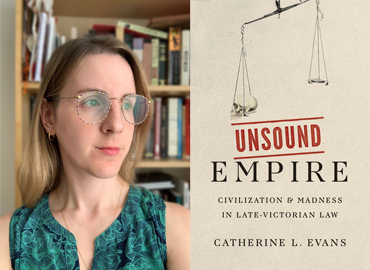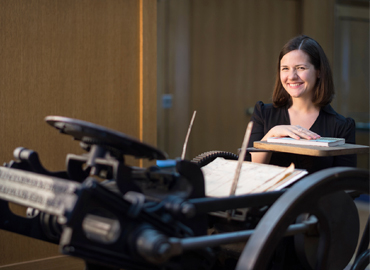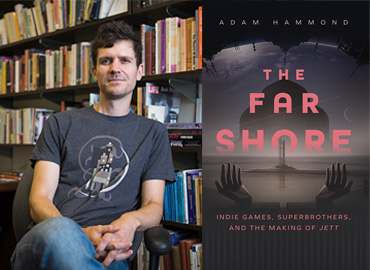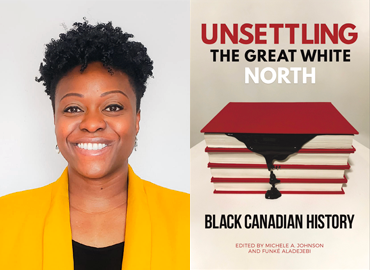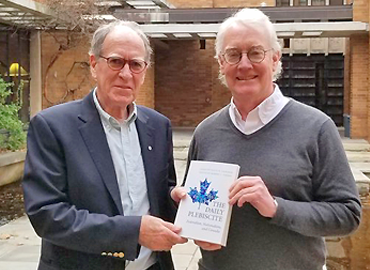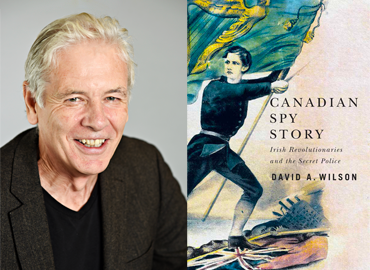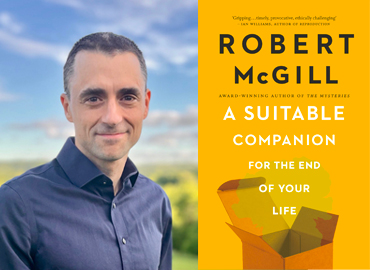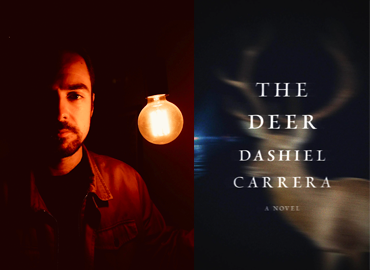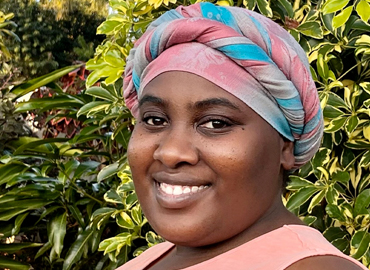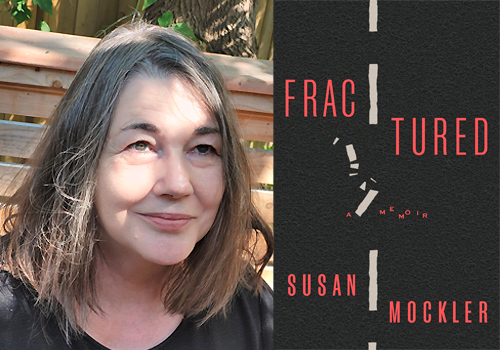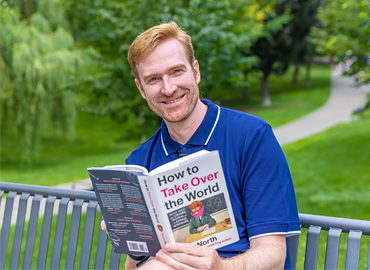From scholarly and literary inquiry and analysis to critically acclaimed fiction, members of the A&S community published an incredibly diverse range of titles. Here are just a few to add to your 2023 reading list.
'Civilization & Madness' in the late Victorian era
The justice system in the British Empire during the 19th century was often condescendingly lenient to those citizens it treated most harshly outside the courtroom. That’s the conclusion arrived at by Catherine L. Evans, assistant professor at the Centre for Criminology & Sociolegal Studies, in her book Unsound Empire: Civilization & Madness in Late-Victorian Law.
Questions of race and gender often factored into whether an accused person was deemed criminally responsible for their actions, says Evans — and often, only certain people met that test. In this way of thinking, “the idea that if you are not white, not English and not male, then you are more primitive and you don’t understand as well as other people do."
Women writers find freedom using letterpress printing
When Claire Battershill took part in the Printing Fellowship Program at Massey College in 2009, she discovered its cast iron printing presses were far more than simply relics of a bygone era of printing. For many women writers and printers, letterpress printing embodied the freedom of artistic control that still draws and inspires artists and writers today.
Battershill, an assistant professor cross-appointed to the Department of English and the Faculty of Information (iSchool) released a book in July entitled Women and Letterpress Printing 1920–2020: Gendered Impressions.
The book explores the relationship between gender and literary letterpress printing from the early 20th century to the beginning of the 21st, as well as the ongoing presence, and even revival, of the letterpress in today’s digital age.
An in-depth look at how video games are created
Adam Hammond, an associate professor in the Department of English, sees the beauty of artistic creation in video games: in fact, he believes it’s one of the most demanding and challenging art forms today. Exploring that passion, he’s written a new book where he shadows the creator of an independent video game called Jett: The Far Shore — following the path from its inception to launch.
In addition to recounting the at times tortuous ten-year development of the game, The Far Shore: Indie Games, Superbrothers, and the Making of JETT also delves into the history of independent video games and how they relate to other forms of independent art such as music and literature.
Black Canadian History captivates readers
Funké Aladejebi has co-edited a new book that she hopes readers will find disruptive and a little surprising. If that’s the readers’ reaction, then Unsettling the Great White North: Black Canadian History has succeeded.
“It's meant to push boundaries, or at least force us to think about those boundaries — it’s by no means a polite representation of Canadian history,” says Aladejebi, an assistant professor in the Department of History.
The book consists of 21 essays from a variety of scholars who explore the diverse, oppressive and often violent experiences of persons of African descent across Canada’s history.
When Canada’s fate hung in the balance
For thirty years — from the mid-1960s to the mid-1990s — Canada was in a constant state of political turmoil. With each new constitutional conference, referendum and bitterly fought election, the separation of Quebec seemed an ever more likely possibility.
Written over the past four decades, David Cameron’s essays on this crisis-riven epoch have now been gathered together in a thought-provoking new book entitled The Daily Plebiscite: Federalism, Nationalism and Canada. The essays by the distinguished political scientist and former dean of the Faculty of Arts & Science offer a skillful analysis of the period and a bracing reminder of the elements that keep Canada together to this day.
Delving into a little-known corner of Canadian history
David Wilson’s book captures an era of Canadian history that has more lies, deception, betrayal and scandals than a Netflix series.
This year Wilson, a professor with the Department of History and the Celtic Studies Program, published Canadian Spy Story: Irish Revolutionaries and the Secret Police with McGill-Queen’s University Press.
The non-fiction book captures Canada in the late 1860s, when a group of Irish revolutionaries known as the Fenians set out to invade Canada in order to liberate their country from British rule.
“It’s an absolutely fascinating story,” says Wilson, noting that his research uncovered shocking revelations such as a sex scandal, a plan to kidnap John A. Macdonald, and a plot to assassinate Queen Victoria.
For those who like dystopian dark comedy
Inspiration for a book can come from anywhere — even the delivery of a mattress.
Robert McGill, a professor in the Department of English and the director of the MA program in English in the Field of Creative Writing, remembers ordering a mattress that arrived in a box. The instructions were simple — take the mattress out and allow 48 hours for it to take shape.
“So I went around for the next few days with this mattress slowly getting bigger,” says McGill. “And in my mind, it felt like a stranger who was gaining their shape in my house.” That idea became part of his latest novel, A Suitable Companion for the End of Your Life. It was released by Coach House Books in June.
Thriller asks readers to question the reliability of memory
When you look back on events in your life, especially traumatic events, did they really happen the way you remember them? Or have you altered your past slightly to make these experiences less upsetting or easier to accept?
Dashiel Carrera explores the unreliability of memory in his first novel — a psychological thriller called The Deer.
For Carrera, who is completing his PhD with the Department of Computer Science, writing a novel is a departure from his other creative pursuits. In addition to being a writer, he’s an accomplished human-computer interaction (HCI) researcher, media artist and musician.
Engrossing tale of mourning at a distance
For Chido Muchemwa, winning Canada’s largest national short story contest for post-secondary students was certainly appreciated. But it’s the affirmation that she can still write after her father’s death that she cherishes most.
Muchemwa, a PhD candidate in the Faculty of Information (iSchool) and the Bonham Centre for Sexual Diversity Studies, recently won the University of Lethbridge’s Bridge Prize short story contest, along with $7,500.
Muchemwa’s story was selected among 187 submissions from across the country. If It Wasn’t for the Nights mirrors events in her life: it tells the story of Charity, a queer Zimbabwean living in Toronto mourning the death of her father in Africa, alongside her family’s reluctance to accept her sexuality.
Psychologist’s memoir describes the challenges of disability
In the summer of 1995, Susan Mockler was riding in a car on Highway 417 between Ottawa and Montreal when the vehicle slammed into a moose. The driver walked away with a few scratches, but the accident left Mockler unsure if she’d ever walk again.
More than 25 years after her accident, Arts & Science alum Mockler is using her new memoir Fractured to change the way society thinks about — and treats people with — disabilities.
"I want to raise awareness about obstacles in the built environment that continue to exclude people,” says the clinical psychologist, who graduated in 1986 with a psychology degree as a member of Victoria College.
A tongue-in-cheek guide to world domination
Alum Ryan North wants to help you take over the world — and he’ll be using his computer science degree to do it. His new book, How to Take Over the World, is a not-to-be-taken-literally guide to world domination. With science to back him up, North walks readers through a series of villainous schemes such as how to create secret lairs in the sky, destroy the internet, achieve immortality and travel through time.
“I wanted the book to do what it says on the cover, so all the science is true,” says North, who earned his master of science in computational linguistics — a discipline focused on understanding language from a computational standpoint — from the University of Toronto in 2005.


